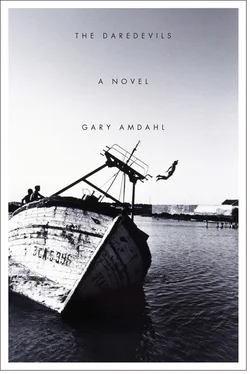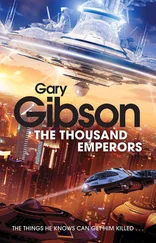“You really know your business,” said Charles. Vera looked at him skeptically, and he said, “I mean your history.”
Vera burst out laughing. “My business, yes indeed!” She stopped laughing rather suddenly. “Rosemary taught me everything I know. Via Jules, who had all the books in the first place. I would be a frustrated dolt without them.”
He nodded as if he knew this to be so, strangely, because it was not flattering to Vera and he had not meant to do it. Then he turned to the press. “It’s beautiful.” He glanced at Vera in a way that suggested he was talking about her and not the press. “It’s like William Morris’s.”
“Yes. Didn’t I say so.?”
“Oh yes, you, it’s — yes. Have you read News from Nowhere ?”
“No.”
“Well it’s a good novel if you ever have some time on your hands,” he said, a little combatively. Did he want to replace Rosemary and Jules as her tutor? He seemed so absurd to himself that for a second he thought he might jump up and run away.
Then she was hanging in his arms and crying and they were kissing ferociously; she smelled of tobacco and tasted of salt and as they moved around the press to the bed he saw a white ashtray full of crushed and burned butts, black sprinkles of tobacco, blacker smears of tar. He became ravenous, ravening, for other deeper riper smells and slicker textures.
Afterward he accepted a drink of whiskey. He had drunk before, but not much, had never been drunk, a little wine at table that he had to admit enlivened him rather ominously — but never drunk. Drunkards were unknown in the family and avoided publicly. It went down hard but flowed smoothly into every vein and artery of his body and at once both warmed and cooled him so that he felt satisfied and lustful, depraved and magnificent, languorous and on fire, all at once. He fumbled wanly with a cigarette and came to think that he had been wrong about alcohol and tobacco. All he needed now was a firearm — which of course were not proscribed but only easy to lay his hands on up at the ranch. Vera gave him another drink and then put the bottle out of his comically flailing reach, telling him sternly that further drinks would place his erection in jeopardy. He laughed with derisive abandon at the thought of impotence.
Everything that had happened to him had happened long ago and far away.
There was in fact a revolver beneath the bed but Vera kept this information to herself. In the exhausted peace that followed what seemed like a never-ending cycle of dazed orgasm and reawakened lust, in stinking darkness of the little room, in the quiet glugging of whiskey from the bottle and smacking of lips, he felt he had come to an earthy and practical understanding of everything he hadn’t been taught in school, in books, sermons, talks with Father, Mother, Alexander, Andrew. Plato and his Statesman were particularly, grievously, wrong. A hero was born to ascend the heights of human courage and ecstatic selflessness but just as surely to descend to the hell of vice, sin, squalor, and barbarism. Not to dwell there, nor strictly speaking to enjoy it, but to save good people and punish bad people. No, not even that: simply to know. It was so simple, and he glowed with gold and iron certainty of it. The lamp hissed and sputtered, the light evened and faded and died, and at some point he understood Vera had risen to shut and lock the door. Then she was beside him again and he slept for what seemed like years, dreaming of many small groups of people, all of whom seemed to know and respect him, even to look to him for guidance, as they made a serious but pleasant journey, on foot, through a hilly forest. The sound of their footsteps was somehow the most remarkable feature of the dream. Then an electric light was turned on and blinded him. He had not known there was an electric light in the room, and he was unable to think beyond the strangeness of it, certain only that he was no longer dreaming.
It was a light for corpses, not living people.
In the dream he felt blind and possibly dead. He became frightened. He turned his head and saw Warren Farnsworth staring at him from the doorway. The look on Farnsworth’s face was one of inscrutable grievance and Charles’s immediate reaction was to be annoyed. That was when he knew he was awake. It was, however annoying on the surface, a look he would never forget. When had he stood up? Was he naked? Farnsworth swung a blackjack high and hard into his temple, and he went down.
If he thought that Jules would be a source of support as well as enlightenment in this new situation, he was made immediately to understand otherwise. He sat on the edge of the little bed and Jules stood over him, his finger leveled angrily at Charles’s face. This finger hovered just this side of focus and it irritated him a great deal. Jules meanwhile was trying not to shout, trying not to sputter. He had no trouble with what Farnsworth had done! He would have done the same thing in his place! A woman Charles did not know, who was wiping the blood from Vera’s face with a rag and hot water, looked up at this. She looked angry or disgusted or defiant, and yet said nothing, returning carefully to Vera’s brow, which was split open. It was Charles, Jules said, still not quite shouting, thrusting the finger even nearer, that he had all the trouble with. He did not know what the fuck Charles was doing there. Vera, with difficulty around the rag, said that he was there because she had invited him. Jules had to wonder then what the fuck she was doing there as well. Vera stared at him, aghast, around the woman’s hands and the bloody cloth.
“Awful lot of poor decisions made here tonight,” she sputtered furiously, “and you are going to choose mine to condemn?”
Charles said he was there because he loved Vera. The woman shushed him, speaking clearly to him but not looking up from Vera’s wound, waiting for Jules’s hypocrisy to catch up with his anger, which it finally did. He deflated visibly and hung his head. He was ashamed of himself, he apologized, but managed to leave the room nevertheless with an air of unappeased anger. The women smoldered with scorn while the bandaging and smaller, murmuring ministrations went their full course and were, at long last, complete.
A little while later, Jules, the woman, and Charles escorted Vera to the office of a nearby dentist who was competent to stitch flesh, and this man, though sleepy or drugged, put twelve perfect stitches over Vera’s right eye. It was then decided that drinks were in order, so they went to the Fior d’Italia and sat outside. Vera insisted on whiskey, so a bottle and a pitcher of water were brought to the little table. A glass was prepared for Charles and he drank it in a manner and at a speed that seemed commensurate with the tempo of the table, but it went with incredible speed straight to his head. He had not realized how earnestly in composure he’d been holding himself. Not one breath or flicker of muscle had been expended that was not strictly necessary. With the coursing of the whiskey, however, he began to feel as if composure were a gift of the gods, and he glowed with easy gratitude. Anxiety and tension and pain he hadn’t let himself recognize began to flow out of him, like blood from a mortal wound, and he laughed warmly and generously but quietly at whatever was being said.
“He had no business being down there,” Vera said flatly but with conviction.
“No business?” Jules wondered. “ No business?”
“Shut up, Jules,” suggested the woman quite pleasantly, whose name Charles still had neither caught nor sought.
“We had an agreement,” said Vera, less flatly and with less conviction.
“What sort of agreement?” asked the woman.
“No doubt,” said Jules breezily, “an unspoken one.”
Читать дальше












